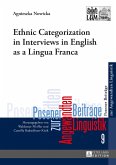This book is about the most common use of English in present-day Europe: English as a lingua franca (ELF). It argues that ELF develops as a natural consequence of language spread and needs to be recognised as a legitimate use of English that is appropriated by linguistically diverse European citizens for their daily communicative needs. Within this theoretical framework, the volume focuses on a sample of European ELF data, comprising four meetings between highly experienced ELF speakers debating the creation of a common European higher education area. The author compares these data with those of postcolonial New Englishes in respect to both the contexts of their occurrence and their lexicogrammatical features. The book presents a case study of the third person -s , which illustrates that the variable use of the -s morpheme is characteristic of contact situations more generally and additionally motivated by the irregular nature of Standard English verb morphology.
Bitte wählen Sie Ihr Anliegen aus.
Rechnungen
Retourenschein anfordern
Bestellstatus
Storno








